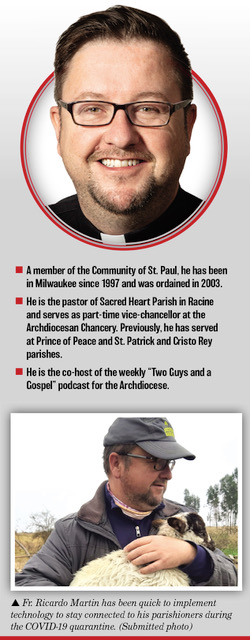COLLEEN JURKIEWICZ
CATHOLIC HERALD STAFF
Have you always wanted to be a priest?
No — not even close.
What drew you to consider this vocation?
I met members of what is now the Community of St. Paul — I wasn’t even going to church when I met them. They were missionaries, and they caught my attention.
What was it that caught your attention?
A very practical way to live the Gospel, and the type of relationships they had with one another. They seemed to be true brothers and sisters.
How did you end up here in Milwaukee? What was it like acclimating to this new culture?
This was where the community was opening a new house at the time; we have several priests here now. I remember driving to my first class not totally sure if I would understand the professor. I got stopped by the police on the first day, too, as I was driving into the seminary.
You got stopped by the police? Were you speeding?
It didn’t feel like speeding to me, but the speed limits are a little lower here than at home. I didn’t get a ticket; he understood my explanation and felt very bad for me.
You said you feel that your parish, Sacred Heart, has been engaging on a higher level since this crisis began. Why do you think that is?
I think that many bad things come with this crisis but I think it also has given us an opportunity to review our priorities, and I think people have rediscovered how faith plays a very important role in their lives.
What are some things you are doing to stay connected to your parishioners during this separation?
We went online right away, because we saw it coming. Being from Spain, I saw what was happening there. We already had some experience with technology because it’s a hobby of mine, making videos and broadcasting. We do Mass every day on Facebook and on the weekends, too. I have a chat with my parishioners every evening at 6:30 p.m. Some days, I would have 20 people at daily Mass — now, at least 70 devices connect, and I’m sure sometimes there is more than one person behind the device; so we have multiplied our engagement.
Do you think that will continue when this crisis passes?
I know that there is a resurgence of faith right now, but once we come back it will be a matter of seeing how consistent that is. I’ve always been a proponent of providing quality content — with the homily, the liturgy, the faith formation programs — and I always believe that the key is quality.
You’ve been able to reach out to parishioners who aren’t online, too, haven’t you?
I got an email from the daughter of an elderly parishioner saying, it’s very nice you are doing all these things online but my mom doesn’t have access. I called her mom myself and she didn’t answer the phone; so I drove my car and, maintaining social distancing, went to see her.
What is it like being a priest these days — saying a Mass without a congregation?
I am very aware of who is behind the electronic connection — I know who is watching us because I’m blessed to be in a very middle-sized parish; so I know almost everybody. I think that helps.
How are your brother priests holding up in the face of all of this, and all the unique challenges that have presented themselves during this time?
It’s difficult to answer for other people. I live with two other priests at the community house across the street, and at least I’m not totally alone. A crisis catches you where you are. If you knew technology before, you know technology, but if you don’t, it’s very difficult to learn now. If you parish was ready, your parish was ready; if it wasn’t ready, you can fix some things but it’s much more difficult.
What can we do to support our priests during this time?
For me, once people connect and engage, I feel like that’s energy and I can do anything. What is tough is to work very hard and not to get feedback, not to get connection or participation. If people can appreciate what we do by participating, that’s all we need.
How is your family doing, back in Spain, in the midst of this?
I have an uncle dying of the virus, and the archbishop mentioned it in the conference call we had with priests last week — I asked him to mention it, because this way people will take it more seriously. The safety of our people is much more important than anything. My parents are elderly — 83 and 73 — and we are keeping them at home, and it’s very funny that my father the other day asked for a Zoom meeting with his children and grandchildren. I was very worried because I thought maybe after 20 days of being in a small apartment he would say, “I’m done” — but no, he was fine; he just wanted to see us.
